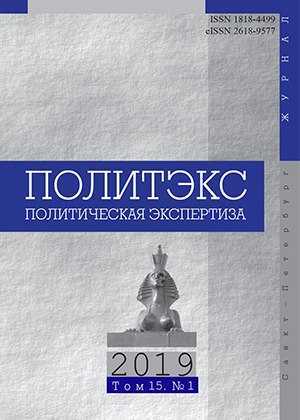THE INSTITUTIONALIZATION OF LAW EDUCATION IN RUSSIA
DOI:
https://doi.org/10.21638/spbu23.2019.103Abstract
The article brings to light the process of institutionalization of law education in Russia, taking place due to the modernization of the institution of the Commissioner for human rights. The evolution of the latter is shown to be a process of updating and expanding the list of its functions. In modern constitutional law, the main function of the institution is human rights law, while the security functions have also expanded markedly. These are such functions as law education, legislative activity, parliamentary control, and public control. The institutionalization of law education is demonstrated to cover both the federal and regional levels of public authorities and to be expressed in updating the ideology, forms, methods and recipients of law education, and in forming practices adequate to the information society and the service state. The indicators of this process are also changes in the organizational and information support for the activities of human rights commissioners in the Russian Federation. Traditional and new technologies of legal education used by human rights commissioners are distinguished, forms of involvement of human rights commissioners in the system of professional legal education are defined. Law education of civic society activists is highlighted as an independent aspect in the institutionalization of law education, which contributes to citizen mobilization and public capacity of civic society, brings together domestic and European practices of law education. The features of law education for civil activists are allocated, the first experience of citizen education is analyzed, the offers for the regional concepts of law education reflecting these features are formulated.
Keywords:
law education, Commissioner for human rights, citizen mobilization, citizen participation, citizen education, service state
Downloads
References
Андрианова А.Д. Мониторинг деятельности субъектов Российской Федерации в сфере пра- вового просвещения населения в 2016 году // Мониторинг правоприменения. 2017. No 3. С. 66–70.
Колобова Т.В. Взаимодействие уполномоченных по правам человека в субъектах Российской Федерации с органами государственной власти и правоохранительными органами в сфере правового просвещения // Вестник Воронежского института ФСИН России. 2016. No 1. С. 69–73.
Правоприменительная практика в области гражданского образования и просвещения в области прав человека: доклад / под ред. А. Ю. Сунгурова. СПб.: Норма, 2018. 248 с.
Симонян К. В., Тыртышный А. А. Лучшие правопросветительские практики аппарата Упол- номоченного по правам человека в Российской Федерации как инструмент создания единой общероссийской системы правового просвещения в сфере прав и свобод человека // Вестник российского нового университета. Сер. «Человек и общество». 2017. Вып.2. С.15–23.
Сунгуров А. Ю. Институт омбудсмана: эволюция традиций и современная практика (опыт сравнительного анализа). СПб.: Норма, 2005. 384 с.
Maude F. Future of government services: 5 public service reform principles. 2014. 24 Feb. // Gov.UK. URL: https://www.gov.uk/government/speeches/future-of-government-services-5-public-service- reform-principles (дата обращения: 16.09.2018).
References
Andrianova A.D. Monitoring deiatel’nosti sub’’jektov Rossiiskoi Federatsii v sfere pravovogo prosveshcheniia naseleniia v 2016 godu [Monitoring of activity of subjects of the Russian Federation in the sphere of legal education of the population in 2016]. Monitoring pravoprimeneniia, 2017, no. 3, pp. 66–70. (In Russian)
Kolobova T. V. Vzaimodeistvie upolnomochennykh po pravam cheloveka v sub’’jektakh Rossiiskoi Federatsii s organami gosudarstvennoi vlasti i pravookhranitel’nymi organami v sfere pravovogo prosveshcheniia [Interaction of human rights commissioners in the subjects of the Russian Federation with public authorities and law enforcement agencies in the field of legal education]. Vestnik Voronezhskogo instituta FSIN Rossii, 2016, no. 1, pp. 69–73. (In Russian)
Maude F. Future of government services: 5 public service reform principles. 2014. 24 Feb. Gov. UK. Avaliable at: https://www.gov.uk/government/speeches/future-of-government-services-5-public-service-reform-principles (accessed: 16.09.2018).
Pravoprimenitel’naia praktika v oblasti grazhdanskogo obrazovaniia i prosveshcheniia v oblasti prav cheloveka: doklad [Law enforcement practice in civil and human rights education: report]. Ed. by A.Iu.Sungurov. St Petersburg, Norma Publ., 2018. 248 p. (In Russian)
Simonian K. V., Tyrtyshnyi A. A. Luchshie pravoprosvetitel’skie praktiki apparata Upolnomoch- ennogo po pravam cheloveka v Rossiiskoi Federatsii kak instrument sozdaniia edinoi obshcherossiiskoi sistemy pravovogo prosveshcheniia v sfere prav i svobod cheloveka [Best legal education practice of the Commissioner for human rights in the Russian Federation as a tool for creating a uniform, nationwide system of legal education in the field of the rights and freedoms of the person]. Vestnik rossiiskogo novogo universiteta. Ser. “Chelovek i obshchestvo”, 2017, iss. 2, pp. 15–23. (In Russian)
Sungurov A.Iu. Institut ombudsmana: evoliutsiia traditsii i sovremennaia praktika (opyt sravnitel’nogo analiza) [The Ombudsman’s Office: the evolution of traditions and modern practice (experience of comparative analysis)]. St Petersburg, Norma Publ., 2005. 384 p. (In Russian)
Downloads
Published
How to Cite
Issue
Section
License
Articles of "Political Expertise: POLITEX" are open access distributed under the terms of the License Agreement with Saint Petersburg State University, which permits to the authors unrestricted distribution and self-archiving free of charge.




